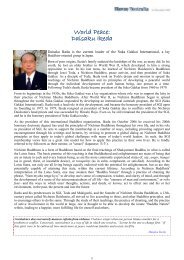World Peace - Bharatiya Vidya Bhavan Australia
World Peace - Bharatiya Vidya Bhavan Australia
World Peace - Bharatiya Vidya Bhavan Australia
Create successful ePaper yourself
Turn your PDF publications into a flip-book with our unique Google optimized e-Paper software.
Low Salt Syndrome<br />
There seems to be a sudden spurt in cases of low salt<br />
syndrome being diagnosed inside the Intensive Care<br />
Units in hospitals these days. Any unexplained illness,<br />
especially coupled with delirium or coma, where the diagnosis<br />
is not obvious, is labeled as Low Salt Syndrome!<br />
The laboratory reports do oblige doctors in their efforts.<br />
Admission to an Intensive Care Unit has become<br />
sine qua non for any elderly patient getting admitted to<br />
the hospital, irrespective of his/her disease.<br />
More and more doctors seem to be treating the reports<br />
rather than the patient and admissions to ICUs<br />
are on the increase these days. The reasons for this<br />
epidemic seem to be more than one. A recent American<br />
study showed that 90% of the hospital profits (not<br />
income) come from keeping dying patients in the ICU<br />
for the last ten days of their final outward journey. The<br />
leading medical journalist of New Zealand, Hillary Butler,<br />
labelled the present scenario in modern medicine<br />
as a Corporate Monstrosity. Ruth Richardson, a medical<br />
historian, seems to agree with her view. All human<br />
ills, in every field, not just in medicine, are the direct<br />
fallout of Corporate Greed! There is a movement in Europe<br />
against Wall Street Greed, but, in effect, it is not<br />
just the Wall Street; greed exists across the board in<br />
the corporate world.<br />
An experienced American physician, Ken Murray, in a<br />
candid article in Zocalo Public Square, an online magazine<br />
of ideas, exposed what doctors do when the<br />
chips are down for themselves: Almost all medical<br />
professionals have seen what we call futile care being<br />
performed on people. That’s when doctors bring the<br />
cutting edge of technology to bear on a grievously ill<br />
person near the end of life.<br />
The patient will get cut open, perforated with tubes,<br />
hooked up to machines, and assaulted with drugs. All<br />
of this occurs in the Intensive Care Unit at a cost of<br />
tens of thousands of dollars a day. What it buys is misery<br />
we would not inflict on a terrorist. I cannot count<br />
the number of times fellow physicians have told me, in<br />
20 | <strong>Bhavan</strong> <strong>Australia</strong> | July 2012<br />
(Hyponatraemia)<br />
words that vary only slightly, “Promise me if you find<br />
me like this that you’ll kill me.” With the corporatisation<br />
of hospitals there is pressure on the hapless doctors<br />
to earn more and more to be economically viable.<br />
“For a man with a hammer in the hand and wanting to<br />
use it, everything in this world looks like a nail needing<br />
hammering”, was the considered opinion of Mark<br />
Twain. These coupled with routine poly-pharmacy<br />
being practised on every patient, especially in the<br />
geriatric age group, makes it possible that the adverse<br />
drug reactions and drug interactions add to the burden<br />
of low salt syndrome in this age group. Drugs as<br />
the cause of hyponatremia should be kept in mind in<br />
every patient proved otherwise. The other causes of<br />
hyponatraemia are rather uncommon except in patients<br />
in heart failure.<br />
In recent studies in the US, it was clearly shown that<br />
unless an ICU has round the clock unless specialist intensivist<br />
support, mortality and morbidity does not<br />
come down with any ICU. The present interest in<br />
teleintensivist support for ICUs has been shown to<br />
save many lives compared to the conventional ICUs.<br />
So simply getting patients inside an ICU where there is<br />
no round the clock specialist intensivist cover, the<br />
mortality could be more due to various other disadvantages<br />
of ICU which are beyond the purview of the<br />
article. The Commonwealth Fund and Rand Europe announced<br />
this week that the United States ranks last<br />
among developed countries in “mortality amenable to<br />
health care”.<br />
A study by Banks, Marmot, and Oldfield showed that,<br />
“by most measures, people in the highest one-third of<br />
income in the United States have outcomes similar to<br />
those in the lowest one-third in the United Kingdom—<br />
the rich in the United States, having unfettered access<br />
to expensive, high-tech, but fragmented and depersonalised<br />
care, are not better off than the poor in a<br />
country that has a comprehensive system for providing<br />
access to integrated, personalised, prioritised









